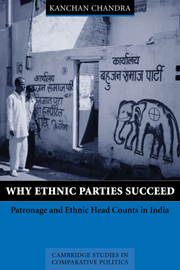Book contents
- Frontmatter
- Dedication
- Contents
- List of Maps, Figures, and Tables
- List of Abbreviations
- A Note on Terminology
- Acknowledgments
- 1 Introduction
- Part I Theory
- Part II Data
- 6 India as a Patronage-Democracy
- 7 The Bahujan Samaj Party (Bsp) and the Scheduled Castes (SCs)
- 8 Why Sc Elites Join the Bsp
- 9 Why Sc Elites Join the Bsp
- 10 Why Sc Voter Preferences Translate into Bsp Votes
- 11 Explaining Different Head Counts in the Bsp and Congress
- 12 Extending the Argument to Other Ethnic Parties in India: The Bjp, The Dmk, and The Jmm
- 13 Ethnic Head Counts and Democratic Stability
- Appendix A Elite Interviews
- Appendix B Ethnographies of Election Campaigns
- Appendix C Content Analysis
- Appendix D Description of Survey Data
- Appendix E Description of the Ecological Inference (EI) Method
- Appendix F Method Used to Estimate Ethnic Voting Patterns
- Bibliography
- Index
- Miscellaneous Endmatter
9 - Why Sc Elites Join the Bsp
from Part II - Data
Published online by Cambridge University Press: 19 October 2017
- Frontmatter
- Dedication
- Contents
- List of Maps, Figures, and Tables
- List of Abbreviations
- A Note on Terminology
- Acknowledgments
- 1 Introduction
- Part I Theory
- Part II Data
- 6 India as a Patronage-Democracy
- 7 The Bahujan Samaj Party (Bsp) and the Scheduled Castes (SCs)
- 8 Why Sc Elites Join the Bsp
- 9 Why Sc Elites Join the Bsp
- 10 Why Sc Voter Preferences Translate into Bsp Votes
- 11 Explaining Different Head Counts in the Bsp and Congress
- 12 Extending the Argument to Other Ethnic Parties in India: The Bjp, The Dmk, and The Jmm
- 13 Ethnic Head Counts and Democratic Stability
- Appendix A Elite Interviews
- Appendix B Ethnographies of Election Campaigns
- Appendix C Content Analysis
- Appendix D Description of Survey Data
- Appendix E Description of the Ecological Inference (EI) Method
- Appendix F Method Used to Estimate Ethnic Voting Patterns
- Bibliography
- Index
- Miscellaneous Endmatter
Summary
The previous chapter argued that a representational blockage in the competition was necessary in order to induce Scheduled Caste elites to join the BSP. In this chapter, I link representation with voter preferences. I show that Scheduled Caste voters in Uttar Pradesh and Punjab formulate preferences by counting heads across parties rather than by examining the issues that the parties stand on. Because the BSP had a monopoly on the representation of Scheduled Caste elites in these two states between 1984 and 1998, Scheduled Caste voters preferred the BSP to other parties. However, voters from the Scheduled Caste categories that were better represented in the BSP were more likely to prefer it than voters from underrepresented Scheduled Caste categories. The link between representation and voter preferences, furthermore, holds not just for Scheduled Caste voters but for voters from all other ethnic categories as well.
The data that I use to develop and test this proposition are drawn from across four elections in India, held between 1996 and 1998. For information about the ethnic profile of political parties, I rely on interviews with party personnel in each state conducted between 1996 and 1998. For party issue positions, I conduct a content analysis of campaign messages during the 1996 parliamentary election campaign. For data on perceptions of salient issues among Scheduled Caste voters, and on Scheduled Caste voter preferences independent of voting behaviour, I draw upon survey data from the Indian National Election Studies for the 1996 parliamentary election. Finally, for data on the voter preferences of other ethnic categories from other elections, I rely upon indirect evidence drawn from party and candidate strategies collected during four election campaigns.
The chapter is organized as follows: Section I predicts the preference distribution of Scheduled Caste voters across political parties in the states of Uttar Pradesh and Punjab if they formulate preferences by counting heads. (I exclude Karnataka from the analysis of Scheduled Caste voter preferences, since the sample of Scheduled Caste voters who expressed a preference is too small to be statistically reliable.) Section II predicts the preference distribution of Scheduled Caste voters across political parties if they formulate preferences by assessing party issue positions. Section III shows that the first prediction captures the distribution of Scheduled Caste voter preferences more accurately than the second. Section IV extends this proposition to voters from other ethnic categories in other states.
- Type
- Chapter
- Information
- Why Ethnic Parties SucceedPatronage and Ethnic Head Counts in India, pp. 196 - 221Publisher: Cambridge University PressPrint publication year: 2004



